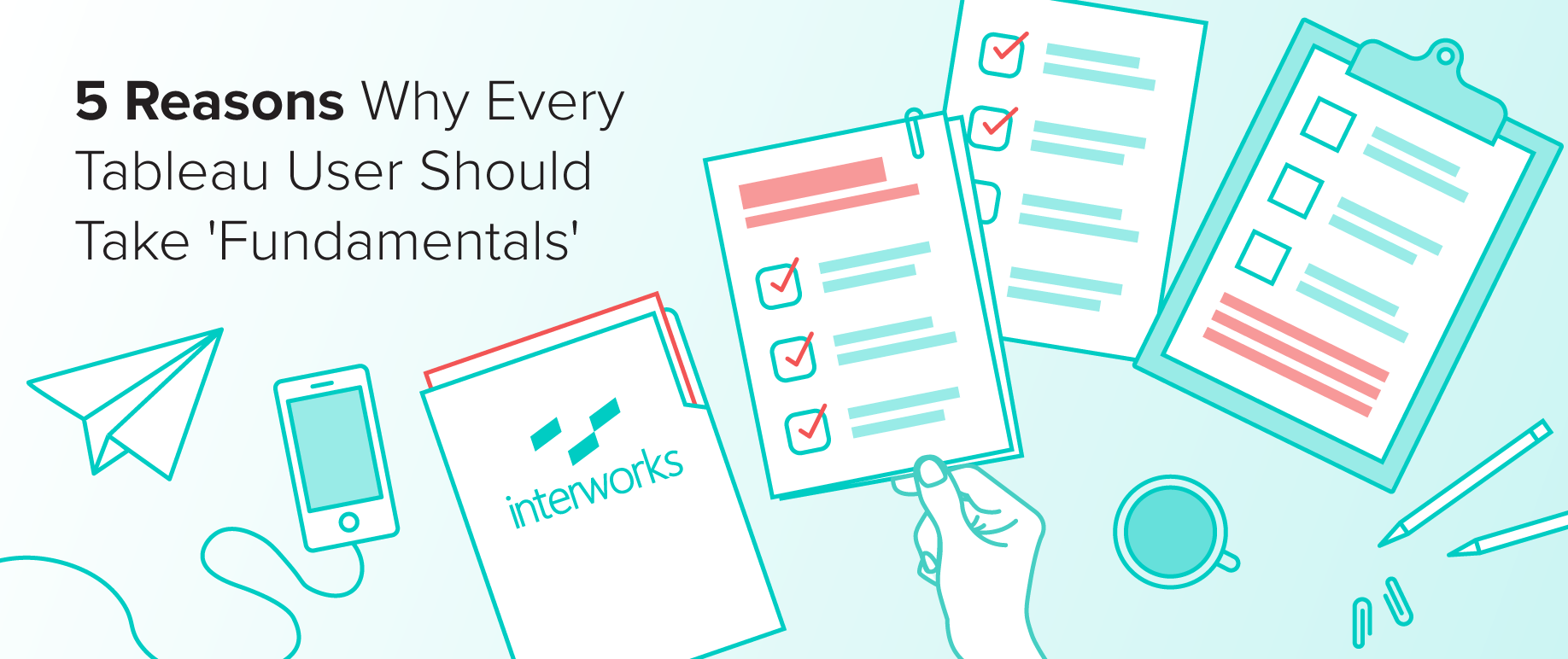
Are you considering taking a Tableau training course? If so, then I need 15 minutes of your time. Hi, I’m a Tableau trainer. I’ve taught students from all over the world, both in person and virtually. I spend most of my day working with Tableau and thinking of ways to help other people work in Tableau. In my time as a Tableau trainer, I’ve seen over and over again new students opt to skip the Desktop I: Fundamentals course and go straight into the Intermediate class.
I’m going to tell you why that’s not a good idea. I’m going to tell you why the DI course is the most important step you can take on your Tableau journey. And I’m saying that as an autodidact that has self-taught nearly everything I use in my professional life.
Let’s break it down into five essential pieces.
1. Talking Tableau
As soon as you enter the course, I’m speaking in a very specific and purposeful way. I’m using Tableau terminology throughout the entirety of the course. You may wonder why when you ask a question, that I restate back to you with different verbiage. It’s because part of this course is teaching you the lexicon of data analytics.
Measures, dimensions, discrete, continuous, hierarchies, groups, marks, scope, geo-roles and more.
Each of these have a very specific meaning. It’s my goal during the DI class to get you to use these terms, so in the future when you talk Tableau with another Tableau user you don’t have to stumble over the terminology. Having a precise and common frame of reference will expedite your learning capabilities.
Are you going to ask for help on your workbook in the Tableau community? Are you going to outline to your data consultant the requirements for this project? Are you googling a tutorial video on how to do advanced techniques? It’s essential you use the right terms to get the right results.
2. The User Interface
Another aspect of the DI course that few people consider is the ease of navigating the tool that one acquires after spending 16 hours training. Trust me, I see this difficulty all the time in the DII course when students haven’t taken Fundamentals. Yes, they can build a parameter like we just demonstrated in the DII course, but then using that parameter in a shared axis bar chart with a reference line becomes a show stopper.
My job is two-fold. The first is to ensure that every student comes away with a positive learning experience. The second is to cover the curriculum of the course so that each student now has mastery of that topic. When you take the DII course, your instructor is assuming you are comfortable with the user interface. The in-class time can then be spent on other types of visualizations and additional functionalities.
3. Core Competency
There is an assumed knowledge that each DII student is expected to possess. There are four topics that are incrementally addressed in each of the three levels of Tableau Desktop training. Those are calculated fields, table calculations, mapping and dashboards. If you don’t have the foundational concepts of these topics, the Intermediate lesson instantly becomes more difficult.
Here is a complete list of the things I teach in my Fundamentals course. Different trainers have slightly different checklists for what they cover, but it’s all essential. Have a look at the list below and see how many of these you know by heart.
- The four most important screens in Tableau Desktop
- Tableau file types
- Metadata & data connections
- The Marks card
- Data preparation
- Advanced filtering
- Advanced sorting
- Groups
- Hierarchies
- Date Parts vs. Date Values
- Custom Dates
- Measure Names & Measure Values
- Aggregations
- Interpreting plots
- Mapping
- Geo-coded fields & non-USA equivalencies
- Exporting data for humans vs. as a data source
- How human brains interpret data
- Calculated fields
- Table calculations
- Scope & direction
- Reference lines
- Dashboards & dashboard actions
- And a whole bunch of chart types
As you can see, there’s a whole bunch of content here. That’s what I’m paid to teach. The jokes and anecdotes are free. In addition, as I cover these topics, I always point my students towards additional resources to learn even more. Even students that have been using Tableau on the daily for a year, still find gaps in their knowledge that are added from the Desktop I course.
4. The Structure of the Course
Another aspect of the course might seem a bit silly or not as useful, but I guarantee it is vital. That’s how Tableau structures the course. There is a well thought out pedagogy to how we are trained to teach. It’s a blended style that sends information to your brain for adoption three different ways: lecture, demonstration and interaction.
Basically, I talk about a concept. I show you the functionality, and then you do it. This is a great way to learn because it reinforces the lesson three different ways.
The other thing about how Tableau has set up their course is that the assignments from the book are set up in a particular way. They start with an intro sentence with your required packaged workbook or data source, followed by summary bullet points of what you are going to be learning, then a finished screenshot(s) of your efforts. Only then do the actual directions start.
For people that are not familiar with the format of these exercises, it can be confusing. The DI course teaches you all the great stuff I listed above in point #3, but also how to take a Tableau class. That’s one less thing you have to think about in each subsequent course. You can fully dedicate your mental RAM to the specific topic and how to apply it.
5. Free Consulting!
Who doesn’t love free stuff? The time in the class belongs to you. I always tell my students to ask questions. Ask about what I’m teaching and ask about what you’re working on in your own workbooks. I have what I consider “office hours” during training days. I get to class a half hour early, finish lunch early and stay late just so students can show me their workbooks and their data for help.
It makes me a better consultant. It makes your training more impactful. It’s a win for you and a win for me. And if I can’t answer your question, I have 200 business intelligence consultants ranging from DBAs, Tableau Zen Masters and BI rock stars on the InterWorks team who can. We live for this stuff.
Embrace the FUN-damentals
I hope that this article has helped push you towards the Desktop I: Fundamentals course. Don’t think of it as “Fundamentals.” Instead, think of it as building the proper foundation for a house. Everything else you learn will be on solid ground with a full understanding of the essential, core features of Tableau Desktop.
Take the Fundamentals first. Trust me. And if you are finding it a tad easy, then ask your instructor to think of new ways to make the exercises more challenging. We feed on your excitement to learn the tool and would be happy to add an extra wrinkle to an assignment to challenge you.
Thanks for reading, and see you in the classroom.

